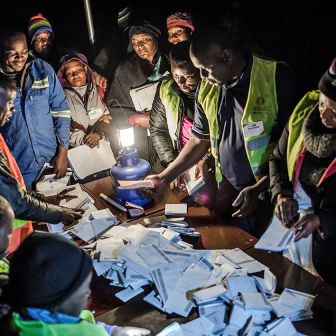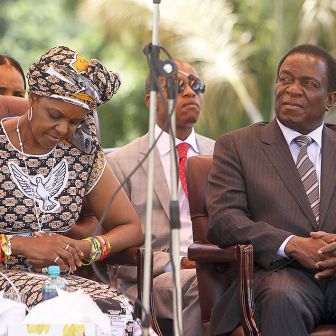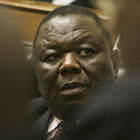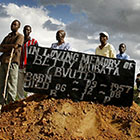AT FIVE IN THE MORNING I woke up with the image of a long human queue in the back of my mind. A friend had sent me some money from overseas, and in order to get access to it I had to be the proverbial “early bird” in order to be the first in the queue at the bank.
As I roused myself from sleep I thought with sober sadness how long I would have to stand in the queue to get my money. I would have to queue for at least three hours before getting served. Standing in queues that appear like mushrooms everyday in Harare has taught me patience. I am amazed and alarmed at my capacity for waiting. The struggle to withdraw money from Zimbabwean banks feels like a ton load of ants crawling and stinging the skin. The daily withdrawal limit is less than one American dollar, barely enough to buy a loaf of bread.
Outside, birds chirped an early morning chorus, their beautiful harmony far removed from the bedlam that Zimbabwe has become. The electricity suddenly failed and I couldn’t make the cup of tea that I was so much looking forward to. Electricity cuts are a common experience in today’s Zimbabwe; we have grown so accustomed to them that we dismiss the dark reality with a flippant remark or a shrug – much like we have become accustomed to long queues and the country’s stagnant politics.
So, after taking a quick bath, I dressed up and dashed to the bus stop. A Japanese-made minibus, the ubiquitous local form of transportation, droned to a stop in front of me, and the conductor inquired whether I was going to town. I jumped inside, and the vehicle jolted over potholes towards the city, stopping here and there to pick up morning passengers along the way. Everyone on the minibus complained about the cost of living in Zimbabwe. It was not surprising: complaining is now common food in the country of my birth; it’s contagious.
In the city, hordes of people had already started forming queues outside the banks as the crimson sun slowly showed itself in the sky. Over the past decade of the Zimbabwean crisis, queues have become a continuous and omnipresent phenomena. We queue for everything: from basic commodities to passports and your own money locked up in the bank. Under the hot sun, in the rain and in cold, we queue. The queues start early in the morning and last into the late hours of the night. I have heard stories that some people have taken to sleeping in queues so that they can get whatever service that they want. I must say I have never gathered courage to sleep in a queue.
On that particular morning, I realised that queues had already mushroomed in snaky fashion throughout the city, with some women opting to sit down on multicoloured cloths spread on the hard ground, waiting their turn to get money from the automated teller machines or to get inside the bank.
As the politically motivated socioeconomic crisis has worn on, the idea of quality service is one that has greatly diminished in my homeland. This has been worsened by the fact that we have a government that is operating in absentia, so for everyone, from industry to the individual, the mantra is always “take care of yourself first.”
Perhaps the most glaring indicator of the collapse of our country is that you can spend a whole day in a queue, doing nothing except waiting, whether you are a professional or not. The system is such that you have no alternative. And like lunatics, we have become accustomed to the abnormality of our situation: we wait, and wait, and wait in despair and hope. We are never sure whether we will be served. It all boils down to the level of luck you have on a given day.
When I arrived at my bank, over fifty people had already formed a queue. Men and women were standing huddled together as if in a crooked North Korean military parade. The morning was chilly, and I kept hugging myself to try and get warm, but that didn’t really help. I cursed myself for having not woken up earlier. If only I had woken up a couple of hours earlier I would have been one of the first in the queue. But I suppressed my frustration somewhere deep into the recesses of the Zimbabwean collective imagination where I can imagine only toxic mental garbage now exists.
Interestingly, the queues have become a form of media, albeit oral. In the queues of despair, people are beginning to exercise freedom of expression which they have long been denied by the state apparatus. Even in the presence of soldiers and policemen who mingle with ordinary citizens to queue for money, people are beginning to speak up. In Zimbabwe, as in many parts of Africa, the media is largely publicly owned, meaning that ruling regimes such as Robert Mugabe’s have a tendency to purvey party-political agendas and ideologies.
In many instances, the public media has been used by the government to sow division within society, promoting hate speech, tribal tensions and racialism while portraying the ruling players as demi-gods beyond reproach. It pits citizens against each other, leaving people distrustful and incapable of collective action.
No one really knows what happens outside the circumference to which their own eyes are witness. Consequently, rumour and word-of-mouth have become the main source of information about the state of my country’s disintegration. In the queues, you hear the masses of Zimbabwe wailing for a respite from their present difficulties: people wail for help, for food, for money, for a change and transformation in the way that the country is being governed.
As I stood in the queue, I heard much that never makes it into the country’s mainstream media. Inevitably, the chatter ends up on subjects related to the way the country is being governed. From the queues, it’s easy to see that people want their dignity and humanity restore. But, for now, waiting is the name of the game.
In the depth of suffering, Zimbabweans are beginning to reclaim their dignity through finding a voice to speak the ills of their nation. So, while queues in Zimbabwe are an indicator of the country’s disintegration, they have got the citizens engaged in a dialogue like they have never done before. The ongoing crisis has helped to make us understand the worst of ourselves, and as we go into the future we will know what needs to be avoided in order for us to become the best that we can be. •




